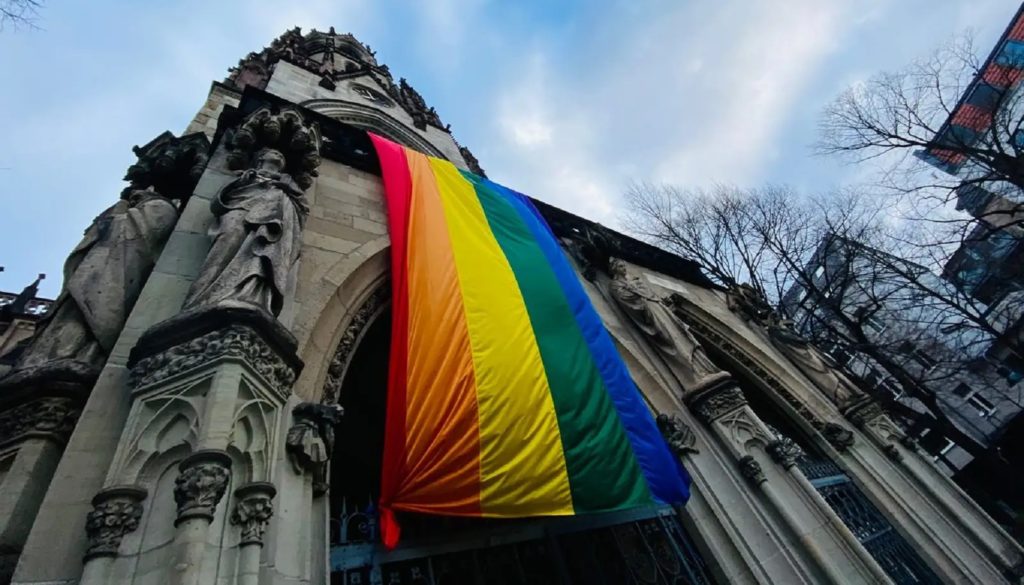As announced, a hundred German Catholic parish priests have blessed on May 10 the couples who asked for it, regardless of their "sexual orientation"; the action coordinated on Twitter with the hashtag #liebegewinnt (love conquers) has become an express and open protest against the note (Responsum) of the Congregation for the Doctrine of the Faith last March, in which it was said: "God does not and cannot bless sin".
What homosexual blessings imply
While the President of the German Bishops' Conference, Bishop Georg Bätzing, stated on April 28 that he considered such public actions "neither a useful sign nor do they point the way forward," since liturgical blessings have "their own meaning and their own dignity," some German bishops stated that they would not act against priests who wanted to celebrate such ceremonies.
On the official website of the German Bishops' Conference, katholisch.deIn her reply to Bishop Bätzing, Julia Knop, professor of Dogmatics at the Catholic Theological Faculty in Erfurt, replied: "Of course, the fact that they are celebrated in broad daylight on a common date and that these actions are coordinated is a sign. A sign that is not primarily directed against the Congregation for the Doctrine of the Faith; its refusal to bless homosexual unions provides, yes, the occasion; but today's sign is primarily directed to those who, because of their sexual orientation, until now could expect at most compassion from the Church and who, according to the Responsum, should not regard it as 'unjust discrimination.'" With your blessing and your prayer, pastors and Catholic communities give a sign of ecclesial solidarity".
Turning the Congregation's assertion on its head, it stated that such pastors "are convinced that they cannot deny God's blessing."
Union with the Pope: guarantee of faith
While the mainstream media - including the first public TV channel - are congratulating themselves for this act of "disobedience against Rome" as if it were an attempt to win an arm wrestle with the Congregation, there is no lack of critical voices; for example, the Pontifex Initiative -a group of young Catholics who defend that "it is not about changing doctrine, but about preaching the faith" - has published a communiqué in which it states: "with these actions, those who carry them out offend the People of God; let us not forget that our faith is Roman Catholic" and that this is not something merely decorative, but that it "constitutes the core of our identity".
Rejecting the affirmations of the Congregation for the Doctrine of the Faith "endangers unity and catholicity", since union with the Pope is "a guarantee of the faith and continuity of the Catholic Church" and active disobedience, or consent to such disobedience, divides the Church.
Union with the Pope is "a guarantee of the faith and continuity of the Catholic Church".
The author and publisher Bernhard Meuser - to whose initiative we owe, for example, the youth catechism YouCat- writes in this regard: "Love is an essential moment in divine revelation. From Genesis and throughout the Scriptures it is accurately described as a unity made up of several elements: that it is a matter between man and woman, that it is exclusive, that it is forever, and that in that love (and not in others) there is a carnal union from which a new life proceeds. That love is 'image and likeness' of the love that is God himself.
The phenomenon of homosexual love is not mentioned anywhere in Scripture. The Church contemplates this reality as an expression of a 'friendship' that goes beyond a certain limit". The action is not about - he continues - "symbolically overcoming discrimination and liturgically demonstrating God's infinite goodness for all people." What it is about is recognize these unions as marriagesThey want 'marriage for all' to be listed as Paragraph B in the Rituale Romanum".
Blessings are to people
According to the well-known journalist Birgit Kelle, "of course the Church also blesses homosexuals... each one individually; but it does not bless everything we do. Who needs a Church that blesses everything, that says 'amen' to everything, regardless of whether it is in line with or against its own rules?" For this journalist, the blessing of homosexual unions has to be seen in a broader context: "LGBT and intersectional feminism have been introduced into the Church".
Who needs a Church that blesses everything, that says 'amen' to everything, regardless of whether it is in line with or against its own rules?
Birgit KelleJournalist
The so-called Central Committee of German Catholics who claims to represent the more than 22 million German Catholics, has just said that from now on he will use 'inclusive language' because he wants to respect all genders and sexual identities, even though God created only two. Along with marriage for all (blessing of homosexual unions), he is seeking ministry for all (priesthood also for women) and sex for all (abolition of celibacy): Sex Meets Church."
A clerical action to a minority sector
And Regina Einig, editor of Die TagespostHe draws a parallel with the divorced and civilly remarried, "who were supposedly hungry for communion. As then, "the desire for a ritual of belonging to a community cannot answer the question to what extent nostalgia for Christ is the motive for participating in such a ritual". He also draws attention to the fact that public opinion in this context is dominated by the "voices of clerics who argue in a biased way.
It is mainly about them: what they think about decisions in conscience, about the magisterium, obedience, pastoral, etc. For some parish priests, not even the low demand of homosexual couples wishing to receive the blessing prevented them from showing off in the media. In this sense, the initiative "love wins" has been a clerical action and at the same time an image of a self-referential Church against which Pope Francis insistently warns".








